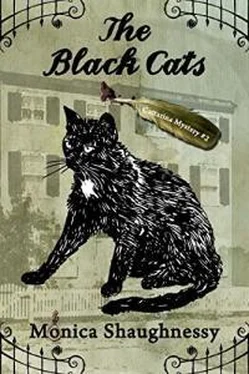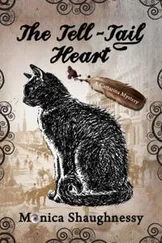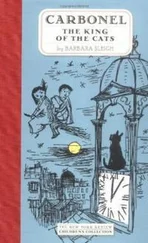“Dear me, that is a problem. I will think on it.” I joined him on the tabletop and groomed his ears. We purred together, harmony and melody.
“Mrs. Arnold may have a salve I can use on your eye,” Sissy said to Midnight. “It can’t hurt to look.” She began a search of the kitchen cupboards, opening and closing the drawers to the jingle of flatware. She unfastened the cabinet at eye level to reveal rows and rows of canning jars filled with brown shavings. “Hello, what’s this?” She took down a container and unlatched the metal catch, releasing a spicy sweet smell that filled the room.
My tongue paused, mid-lick.
“Sassafras bark,” Sissy whispered. “And so much of it.”
The odor drifted through my thoughts, a long forgotten ghost that haunted my memory. I traveled to the edge of the table and studied the jar in her hand. Mrs. Arnold’s tea, of course. The woman had served so many pots of it to her husband—watering him as Constable Harkness did Matilda—that the scent had etched itself into the story, the black cat’s story.
Strong Medicine
“DOCTOR LEABOURNE,” SISSY ASKED, “what do you think of Sassafras tea?”
In the days following the discovery of Mrs. Arnold’s body, Eddy invited Dr. Leabourne to Poe House. The physician visited often, and though he could not cure Sissy, his presence always seemed to give the family hope—in my estimation, the strongest medicine. Late this afternoon, he and I sat on the edge of Sissy’s bed, examining our patient, who reclined against her pillows.
“Sassafras tea?” he asked. Robust of frame and nature, Dr. Leabourne was the catch of the litter. I had never seen a more angular jaw, a fuller head of wheat-colored hair. But he was no Eddy. “Do you mean taken as a tonic?” He took her wrist and placed his fingers over her veins. I did not know what covering them would do but noted it anyway.
“Yes, do you have any faith in it? I thought it might help my ailment.”
“Sassafras is a blood tonic.” He released her wrist and felt her forehead, a more familiar procedure. “It will do nothing for consumption, I’m afraid.” He withdrew his touch and reached for his black bag. “If you like the taste, you may have it as a refresher. But I caution you. It has poisonous effects.”
Sissy sat forward. “Poisonous? How so?”
“It’s very damaging to the organs, especially if they’re weak to start. If taken for too long a period, it causes sweating, nausea, even hallucination.”
“Can it kill a person?”
Dr. Leabourne snapped his bag closed. “In large doses? Most certainly.” He rose from the bed. “You are as well as can be expected, considering the fright you had. Get plenty of good food, plenty of fresh air, and stay—”
“I know, stay home and rest.” She flopped back against the pillows. “That may comfort the body, but it positively shrivels the mind.”
“Feel better, Mrs. Poe. Feel better.” Then he left, as he usually did, to speak Muddy and Eddy in the parlor and give them his diagnosis . In truth, I had already made my assessment. But I much preferred the doctor’s optimism.
Sissy pulled me onto her lap. “Cattarina? Did you hear the doctor? He said sassafras causes hallucinations. Even death.”
Death . Her glee did not match the topic. Perhaps the doctor had left too soon.
“Do you know what this means? Tabitha Arnold didn’t want to fell the sassafras tree. She wanted its bark for tea. Don’t you see?” She held me up and looked into my eyes. “Mrs. Arnold wanted to kill Mr. Arnold, and who could blame her? The debt, the drinking, the violence. Liquor had already weakened his liver, and the sassafras doomed it.” Her eyes twinkled. “ This must have caused the delusions that led to his murderous actions, not the trips to the tavern. Oh, I am so astute!” She hugged me tight. “We make a grand team, don’t we, girl?”
When I wiggled, she released me and left the bed to tidy her hair in the mirror over the dresser. “I give this secret to you and you alone, Cattarina. We must never, ever tell Eddy that any means other than the bottle moved Mr. Arnold to violence.” She slid another pin into her bun. “I have my reasons. And besides, it won’t make a bit of difference to Mr. Arnold since he will live out the remainder of his days in an asylum. And I do mean days.” She finished by giving the back of her head a partial look in the glass.
We arrived downstairs to find Dr. Leabourne at the door. Eddy tried to press a few coins into his hand, but the good doctor refused and took a handshake instead. Once we were alone, Muddy revived us with a suggestion. “Who would like an early supper? If you don’t expect fixins, you can have it now.”
Supper ? Yes, I would take piece of chicken skin, dear Muddy. I’d already smelled it from upstairs.
“For once, I have an appetite,” Sissy said. “Let’s eat.”
“That is no wonder,” Eddy said, guiding his wife by the small of her back. “Dr. Leabourne says you are in good health.” He ushered her into the kitchen, along with the rest of us, and sat her at the table. “And to celebrate, I’d like to present my story, ‘The Black Cat.’”
“You finished it?” Sissy asked.
“I will leave that to your conclusion, wife.” He produced a scroll from inside his coat. “You broke my heart after the first draft. See if this one is to your liking.” He handed the curled page to her.
The story had taken but an instant to finish after the horror in the Arnolds’ cellar. That very night, once Sissy and Muddy had been put to bed, he and I worked at shaping the letters, staying up until dawn to finish them. My crime solving had yet again inspired him to write. As his muse, this thrilled me since I had begun to feel my importance slipping as of late, at least with regard to his work. The document stayed on his desk another day while he considered it. I likened it to a pie on a windowsill. He must have thought it cool enough to bring down this morning.
Muddy stoked the cook stove with a piece of kindling. “Read the story aloud, Virginia.”
Once Eddy took his seat, Sissy unrolled the paper, her fingers shaking, and recited his words: “‘One night as I sat, half stupefied, in a den of more than infamy, my attention was suddenly drawn to some black object, reposing upon the head of one of the immense hogsheads of Gin, or of Rum, which constituted the chief furniture of the apartment. I had been looking steadily at the top of this hogshead for some minutes, and what now caused me surprise was the fact that I had not sooner perceived the object thereupon. I approached it, and touched it with my hand. It was a black cat—a very large one—fully as large as Pluto, and closely resembling him in every respect but one. Pluto had not a white hair upon any portion of his body; but this cat had a large, although indefinite splotch of white, covering nearly the whole region of the breast.’”
Muddy floured and fried the chicken while her daughter read, nodding at parts of the story. When the old woman turned her back, Eddy took down a tin of jerky from the pantry and fed me a piece. And then another. I came back again, but he waved me away. So I settled next to his feet and contented myself with the sound of Sissy’s voice. I realized now that Eddy could not live without either one of us. To thrive, a writer must have a muse to bring the story and an audience to appreciate it. Sissy and I were not exactly a team. But to quote Ariscatle, “Our whole was greater than the sum of our parts.” Constable Harkness would have to agree. We’d helped him, too.
“Oh, Eddy,” Sissy said at the end, “this is a marvelous eulogy.” She handed the scroll back to him, and he replaced it in his jacket.
Читать дальше












